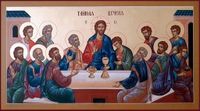As Orthodox Christians around the world observe Good Friday on April 18, 2025, they reflect on the profound spiritual significance of this day, which marks the crucifixion of Jesus Christ. Known as the most solemn day of Holy Week, Good Friday is a time for believers to engage in deep contemplation and prayer, commemorating the suffering endured by Christ.
Traditions surrounding Good Friday are rich and varied, with many customs aimed at honoring the memory of Christ's sacrifice. One notable practice involves bringing a church candle home and placing it near icons. This act is believed to protect the household from illness throughout the year. Furthermore, strict fasting is observed, with many refraining from eating or drinking until the conclusion of the church service.
According to local beliefs, if an individual strictly observes fasting on Good Friday for three consecutive years, they may be granted insight into their death three days in advance. This day is also associated with the idea that abstaining from food entirely can lead to the forgiveness of sins.
For women, there are traditions that suggest engaging in pranks on Good Friday can lead to favorable outcomes in finding a husband. Specifically, the more pranks a single woman plays, the better her chances of attracting a good match. It's said that if she manages to prank twelve people, she will enjoy good fortune for the subsequent twelve months.
However, the day is also marked by numerous prohibitions. It is advised that believers refrain from household chores, including cleaning, washing, sewing, gardening, and even engaging in entertainment such as singing and dancing. Many believe that participating in such activities could bring misfortune or sorrow for the rest of the year. For instance, it is commonly held that if one does not wash their entrance door, they may invite bad spirits into their home. Additionally, pregnant women are cautioned against consuming eggs in any form, as it is believed to lead to difficult childbirth.
In terms of culinary practices, there is a debate over whether it is permissible to bake kulich, the traditional Easter bread, on Good Friday. Some argue that the act of baking should be reserved for closer to Easter to preserve the bread's flavor, while others believe that the church does not prohibit it. Interestingly, bread baked on this day is thought to possess unique properties, such as never spoiling or becoming moldy, and it is often kept behind icons for health throughout the year.
On Good Friday, the consumption of food is heavily restricted. Traditionally, believers are expected to abstain from eating until the Shroud is removed during the church service. Following this, only bread and water are permitted for the remainder of the day. This strict fasting reflects the mourning of Christ's death and the significance of the day.
As believers engage in these traditions, they also focus on the spiritual aspects of Good Friday. The day is dedicated to prayer and reflection, with many attending special church services that commemorate the passion of Christ. During these services, the Shroud, representing the body of Christ, is removed from the altar, and worshippers pay their respects through prayer and reverence.
In addition to the spiritual observances, folk traditions play a significant role in how Good Friday is celebrated. For example, it is customary to complete all household chores by Holy Thursday to avoid working on Good Friday. There is a strong belief that failing to do so could lead to a year filled with strife and disappointment. As such, many prepare their homes and complete their cleaning in advance to ensure a peaceful observance of the day.
Moreover, various omens and superstitions are associated with Good Friday. It is said that if the night before is starry and the morning is clear, the wheat crop will be abundant. Conversely, a cloudy morning is believed to indicate a poor harvest. Despite the general prohibition against working on this day, some traditions suggest that planting certain crops, like parsley and cabbage, on Good Friday can result in a doubled harvest.
As Good Friday approaches, believers are encouraged to engage in acts of kindness and charity, reflecting the compassionate spirit of the day. Whether through donations or helping those in need, these actions are seen as meaningful ways to honor the sacrifice of Christ.
In summary, Good Friday is a day steeped in tradition, reflection, and reverence for the suffering of Jesus Christ. With its unique customs, strict fasting, and emphasis on spiritual cleansing, this day serves as a poignant reminder of the values of sacrifice and compassion that lie at the heart of the Christian faith. As Orthodox Christians prepare for Easter, Good Friday stands as a solemn yet significant moment in their spiritual journey.









